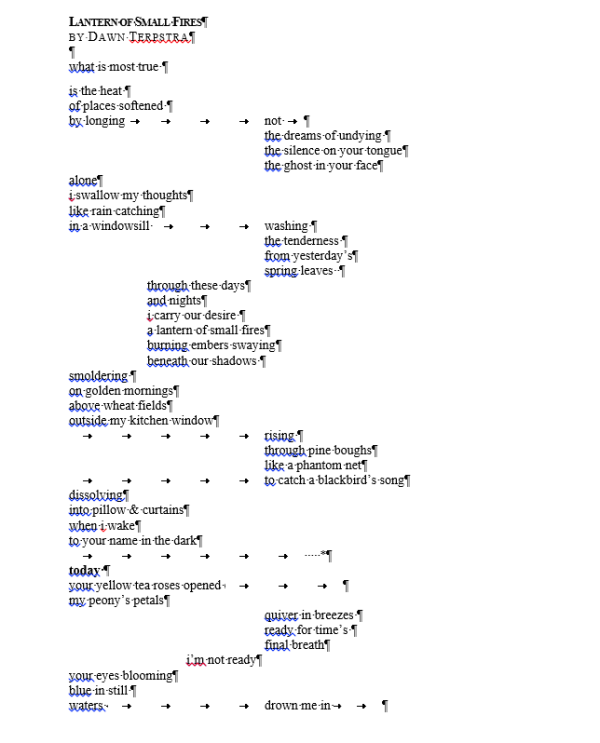Gyroscope Review is pleased to offer the following poems as our nominees for the Pushcart Prize. You can read all the poems on this page, although you might want to check out the back issues and see the other fine works contained in each issue. Every year it’s very difficult to limit ourselves to 6 poems out of the over 200 we publish. After a lot of reading and discussion, here are our nominees from the 2021 issues of Gyroscope Review.
On Seeing Death in the Living Room by A. Rabaduex (Winter Issue 21-1, p. 21)
lantern of small fires by Dawn Terpstra (Fall Issue 21-4, p. 22)
They Call Me Crone, But I Know I’m An Old Woman Seizing Her Power by Mary Alice Dixon (Fall Issue 21-4, p. 10)
After My Last Breath by Suzanne Edison (Fall Issue 21-4, p. 79)
Notes on Four Classified Ads by Martina Reisz Newberry (Fall Issue 21-4, p. 46)
The Archeology of Grief by Diana Dinverno (Summer Issue 21-3 p. 33)
ON SEEING DEATH IN THE LIVING ROOM BY A. RABADUEX duckling blood on the rug and a downy body yellow like daffodils, wilted in the husky’s mouth this is the kind of hour that creates the weight of a manhole cover which the boy will carry onto the school bus into cars and trains rolling over churning rivers past fields of farro into forests scorched by wildfires there isn’t a moment he will not feel its heaviness the life he thought was his versus what he has seen— breath isn’t ours none of it is look at the fingers used to throw the skipping stones the palms to grab the driftwood floating down river—these are not yours the eyes which witnessed a hundred sky lanterns like shooting stars in slow motion, caught in the net of the twilight they are borrowed I’m sorry. that time hides under a leaf until the midday sun I’m sorry. that I pulled you from the sky to feel what these bodies of earth and minds of mist must endure, I’m sorry. but then again, I’m not. you are the center of gravity the sun would have no fire without the pull of you flowers wouldn’t sing to bees, birds would not make trails along the breeze if you hadn’t been brave enough to unpack your suitcase inside four small chambers. If I am but two winding strands of sugary thread, you are the next stitch.


THEY CALL ME CRONE, BUT I KNOW I’M AN OLD WOMAN SEIZING HER POWER BY MARY ALICE DIXON They call me crone they call me witch on fire in this red hour I, inflamed with you, rough wooden stake, hot my cry echoing your bark. Feral woman, I am bound to you by the collared ones, pale Jesuits dressed in dying habits. They call me crone they call me witch because they cannot tame me to their holy orders or bridle me in chaste domestication they burn me at the stake. Come, be my magic broom, shift shape with me, let me ride astride you until only unrepentant flames remain. In that hot hour I will sweep across the earth with other fallen angels rising up uncollared sisters in revolt growing nails like dragon scales they call us crones and witches we, women fierce lived, battle wise.
AFTER MY LAST BREATH BY SUZANNE EDISON set my body afloat, let tide beach my remains, eagle sweets, dinner for sand fleas. Let me driftwood, pocked with insect hieroglyphs a scroll translated touch is the kingdom, open to all as when we lay corkscrewed. Let gulls marrow my skeleton, screech their dissonant chords like a score for the years the child was ill. Let crabs hermit my skull, scrabble the vault that once stored Mood Indigo lyrics next to my lover’s joke that happiness was a trend. When my heart, spiny urchin, finally unchambers, crusting this string of winged vertebrae, I’ll be swept, scaly and shimmering as a lure. NOTES ON FOUR CLASSIFIED ADS CIRCA 19TH CENTURY BY MARTINA REISZ NEWBERRY I WHEREAS MY WIFE, MARGARET OVERSTAY has eloped from my bed and board unlawfully, and without any just cause: I hereby forewarn all persons from harbouring, or trusting her upon y account, as I pay no debts of her contracting after the day hereof. CHRISTIAN OVERSTAY. Bucks county, Falls township, July 25, 1789 Margaret packed her sturdy brown boots, her canvas apron, her one good dress and collar, and her large blue mixing bowl. She wore overalls and a dark flannel shirt and her husband's worn-down slopping boots. She took with her his oak walking stick which he used when gout was upon him and as a tool for whacking her senseless when he was moody. She hooked up the older horse to a small wagon and left for parts unknown at 2 a.m. She also took the flintlock pistol with the ivory stock given to her by her stepbrother, Elias Jones, who told her in a note (passed to her on her wedding day by the laundress) which said, “If what I hear about old Christian Overstay, you’ll need this.” He included an address where he could “always be contacted.” On July 28, 1789, Elias Jones disappeared from a boat dock on Lake Erie. Neither he nor Margaret Overstay were ever seen again. II WHEREAS MY WIFE MARY, without any just cause of complaint hath eloped from my bed and board, all persons are therefore desired not to trust her on y account, as I am determined not to pay any debt she may contract after this date, unless she returns to her good behaviour. All persons are forewarned, at their peril, harbouring her. MICHAEL MCKEEL. December 27th, 1796 After her arm and shoulder and neck had healed from burns she suffered when Michael McKeel threw a bubbling stewpot at her for disagreeing with him in regards to Mr. Thomas Jefferson’s chances of winning the election, she fled his house, carrying only a sewing kit with 3 colors of thread and her Bible. She took up with the Shakers. In a letter to her cousin Molly, she said that the only thing she could ever believe in again was “Christ’s Second Appearing,” and that the scars from her burns would prevent her from ever seeking again a man’s look of love or lust. When she was 86, she died in her sleep, her hands in a posture of prayer. III ANY PERSON KNOWING WHEREABOUTS of my Jessie Brooks Johnson, my wife (nee-Redman) send her home or her address to me. BISHOP BROOKS JOHNSON 1218 Bank st. Washing D.C. 1834 Jessie Brooks Johnson grew tired of waiting up for her husband, Bishop Brooks, who was in the habit of coming home late with women of ill-repute and various drunken companions at which times he called on her to wait on them and serve them dinners and turn down beds for them, while she herself slept on sacks of flour in the basement. In town, she was known to be a quiet, Christian soul who refrained from gossip and never said an unkind word to or about anyone. She stayed with Bishop Brooks Johnson for 12 years then disappeared from their home leaving a short note explaining that she could no longer watch her “husband’s dalliances with unfortunate and diseased women.” She took with her $8.00 in cash and a fileting knife. It is said that, after leaving Bishop Brooks Johnson, she cut off her hair and lived as a man in New Orleans until she died of Cholera. IV A WOMAN named Helen Morrison posted one of the first personal ads, in the year 1727, in the Manchester Weekly Journal. In several words, she professed her desire for a nice gentleman. The message caught the attention of one man, the city mayor, who committed the lady to an asylum for a month. It is not known what the rest of her life was like. Note: These ads were found from various old newspapers on internet sites featuring old-timey classifieds.
THE ARCHEOLOGY OF GRIEF BY DIANA DINVERNO Beneath a bright sky, in a year we dismiss as medieval, a man accompanies a cart piled with bodies, including his wife and child, flesh bruised by disease, to make certain they’re handled with care by day laborers tasked with their delivery to a mass grave outside city walls. Once they arrive, workers heave the dead into earth’s yawn. The man howls, runs down to his family to untangle them from others, place them side by side, fold hands across their narrow chests, sees sun glint his wife’s heavy braid, tendrils framing her face, the delicate band he placed on her finger on an afternoon when they’d wandered among lilies. There is laughter, followed by impatience, when the man refuses to climb from the pit. Instead, he falls to his knees, welcomes the rain of shoveled stone and clay, spreads his body over the woman, her hair still full of light, the boy who only days before sat on his lap, petted, then kissed his cheek.
Links
PDF versions of Back Issues
Pushcart Prize Nominations
Pushcart Prize Anthologies on Amazon
